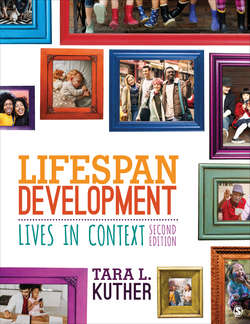Читать книгу Lifespan Development - Tara L. Kuther - Страница 318
На сайте Литреса книга снята с продажи.
Brain and Biological Influences on Development Trauma and Emotional Development
ОглавлениеExperiencing adversity early in life may have epigenetic effects on the genes that regulate responses to stress. The caregiving environment also influences the developing stress response system and can buffer the negative effects of trauma.
iStock/jhandersen
Can infants remember early life experiences? Does exposure to adversity, such as maltreatment, poverty, and violence, influence infants’ development? Very young infants likely do not recall specific experiences and events, but early exposure to trauma may affect infants’ development in ways that can last a lifetime. For example, maladaptive contexts may pose risks of physical harm to children, directly influencing neurological development. However, trauma also poses invisible long-term risks to children’s emotional development and mental health (Blair, 2010).
How does early trauma effect emotional development? The experience of early social adversity may have epigenetic effects on the genes that regulate the endocrine system, which controls hormone production and release at all ages in life (Conradt, 2017). Infancy may be a particularly plastic time in development with heightened potential for lifelong epigenetic changes that may sensitize responses to stress throughout the lifespan (Laurent, Harold, Leve, Shelton, & Van Goozen, 2016). For example, research with adults reveals that childhood maltreatment is associated with an increased stress reactivity in adulthood (Turecki & Meaney, 2016).
However, not all infants respond to early life stress with heightened reactivity. Some infants exposed to trauma show lower levels of stress hormones and reduced reactivity to stress (Turecki & Meaney, 2016). The timing and intensity of adversity influences developmental outcomes. Exposure to particularly intense chronic stress early in development can lead to hyperactive stress responses that may be followed by blunted responses (Laurent et al., 2016). Blunted responses may reflect adaptations to chronically stressful situations. Unpredictable stressors, on the other hand, may lead to heightened stress reactivity as the individual adapts to volatile and unexpected situations (Blair, 2010). Both heightened and blunted stress responses may be adaptive attempts to optimize survival in nonoptimal caregiving environments, yet these adaptations may carry behavioral costs, such as heightened distress when confronted with stress and longer term anxiety and depressive symptoms, which negatively affect developmental trajectories (Laurent et al., 2016).
Early life stress poses risks to emotional development, but the caregiving environment also influences the developing stress response system. For example, maternal presence buffers and regulates infants’ hormonal and behavioral responses to threats (Howell et al., 2017). Sensitive mothers tend to have infants who display better self-regulation during stressful events; intrusive mothers tend to have the opposite effect (Enlow et al., 2014). Warm parenting within a predictable stimulating environment with supportive adults and family can help infants develop the self-regulation skills to adapt to adverse contexts (Blair, 2010). Unfortunately, trauma often disrupts the caregiving system, making adaptation quite difficult.
